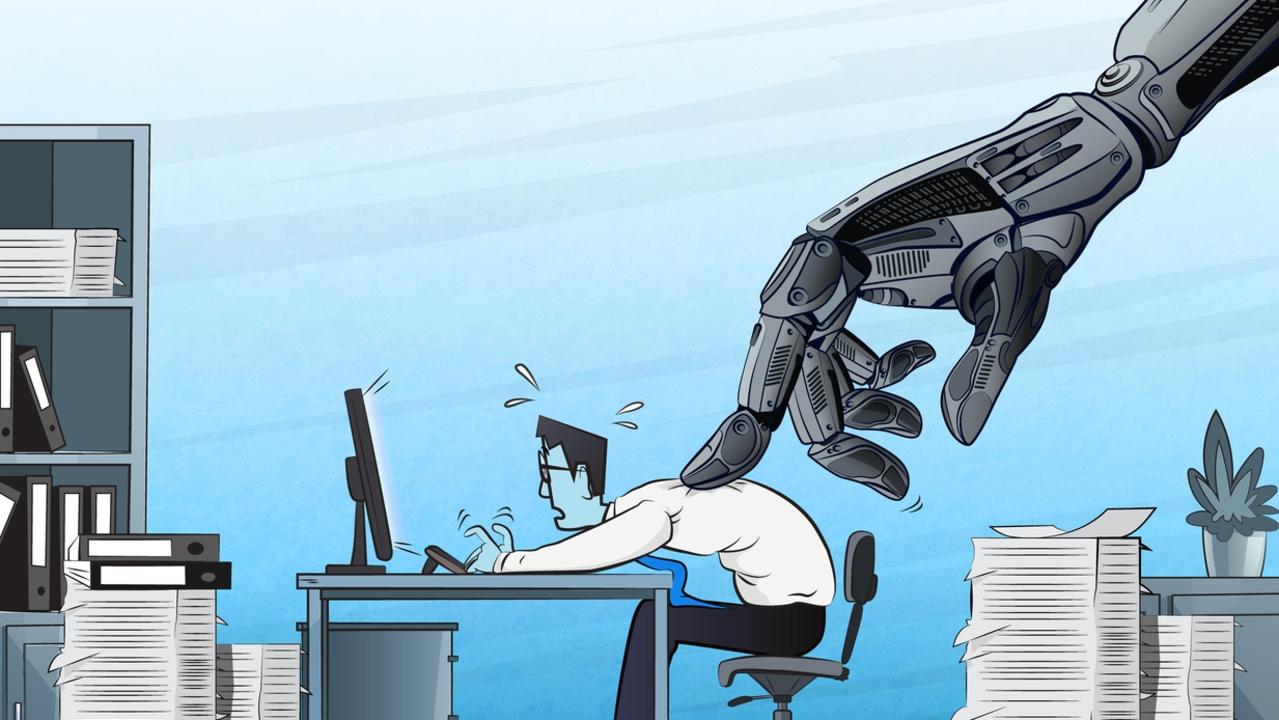Why the economy is about to get some hard truths
The RBA, the banks and big business are threatening to upstage federal Treasurer Jim Chalmers’ impending May budget.
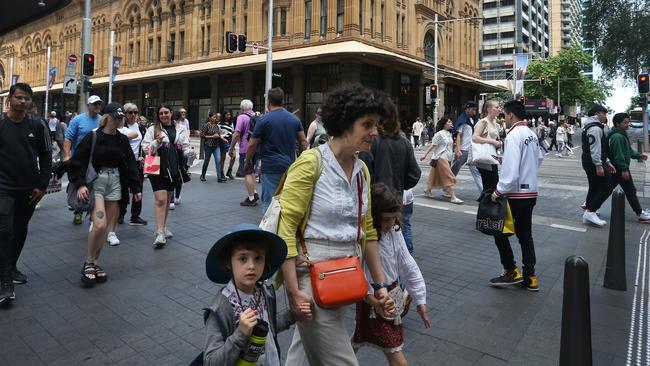
Business
Don't miss out on the headlines from Business. Followed categories will be added to My News.
It’s not just confession season for corporate Australia as the economy is also about to get some hard truths.
By the end of this week, the bosses of the five biggest banks will have handed down accounts, more than 80 corporates will have issued some form of quarterly update and there’s a chance the central bank could move to a hawkish footing.
The deluge of real-time information could overshadow Treasurer Jim Chalmers’ third budget this month. And this will be the pre-election budget that needs to pull off a double pike of keeping the economy from stalling without flaming inflation.
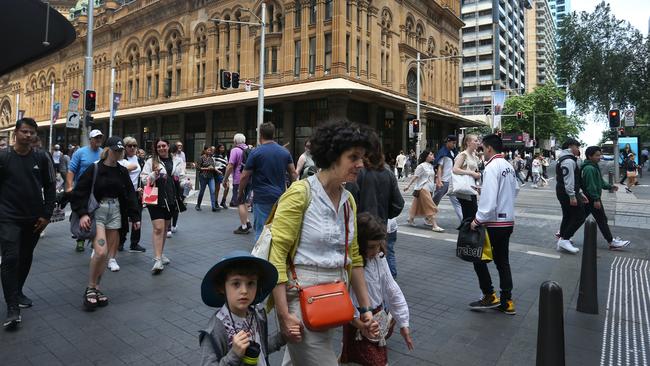
ANZ and Westpac will hand down latest December-half accounts within days and Commonwealth Bank, the nation’s biggest, will post its quarterly numbers.
All are expected to confirm an economy coming off the boil.
National Australia Bank and Macquarie released their December-half numbers last week, where in both cases the headline figure was down.
And the Reserve Bank of Australia starts its two-day board meeting from Monday. While no one is tipping a rate move, it marks the first meeting of the central bank in nearly two months and comes as inflation – here and around the world – is refusing to be put down. This has stoked fears among some the RBA could be forced to increase rates down the track. This would be a savage blow for Chalmers.
Dozens of corporates will make presentations to the Macquarie Australia Conference, the forum widely regarded as the place for mid-cycle profit confessions. By now, chief executives have a pretty good handle on their March quarter and April numbers. And for some it could be the moment the downgrades come through.
So far the word has been resilience, even the NAB profit numbers surprised when it came to demand for business borrowing. But there’s only so long consumers can hold on while rates stay at decade long highs.
Further talk of rates moving higher again could be the difference that puts a clamp on households. Companies such as Qantas, Transurban, Mirvac and Treasury Wines are among those delivering updates.
While the economy continues to avoid a recession, conditions are slowing across the board; retail sales are slowing and softness is now appearing in monthly jobs figures. Elsewhere, the level of new building approvals is at a decade low, keeping upward pressure on rents.
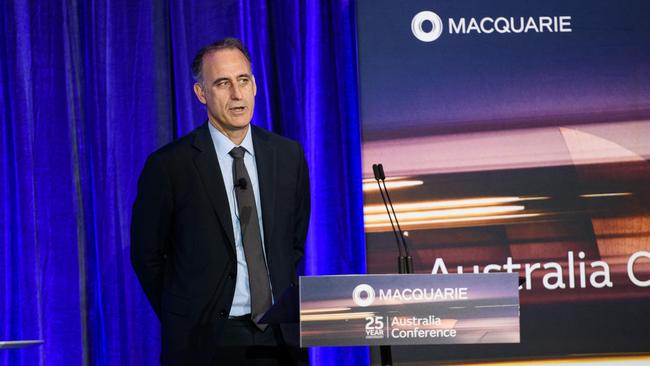
Wesfarmers chief Rob Scott, whose conglomerate oversees brands like Bunnings, Kmart and Officeworks, says spending is holding up, but is a patchwork across the country. Spending in the resources-rich state of Western Australia is steady, while east coast states led by Victoria are “seeing a degree of softness”.
“Across the board, younger families are the ones that are feeling the pinch the most in terms of the inflationary pressures,” Scott tells The Australian. “We are noticing that customers are nervous about the prospect of rates staying higher for longer or indeed going up.”
NAB’s new chief executive, Andrew Irvine, says the economy, while slowing, is proving to be more resilient than anyone would have expected. His bank last week posted a modest lift in lending losses, but from a low base.
“If anything, the more resilient economy just means that rates will take longer to go down,” Irvine says.
“Our view is still November for the first cash rate reduction. But I think you can flip a coin on whether November will happen, because just as easily (it could) be February (next year).
“The one thing we’ve all got to remember, though, is if rates don’t go down, or indeed were rates to go up that’s because the economy is outperforming. And doing better than we expect.”
By the time Friday comes around, it should be pretty clear where the economy is headed.
Buffett cashes up
Is the multibillionaire investor Warren Buffett taking an even more cautious tone?
You wouldn’t be able to tell it by listening to this weekend’s annual meeting of his $US860bn ($1.3 trillion) investment conglomerate, Berkshire Hathaway, where the 93 year old continues to command star pulling power.
And while Buffett prefers to leave it to others to make the big calls about the markets, there is enough in the actions of Berkshire to stir the bears.
This comes down to Berkshire’s decision to sell down some of its monster holding in US tech giant Apple through the March quarter. At the same time, the conglomerate is preparing to build its record cash pile even higher.
The two distinct moves come amid suggestions the next move in US interest rates could be up, not down. This might be good for bonds, but it’s bad for consumer-led stocks like Apple.
Berkshire is known as an investor which buys and holds companies through all kinds of weather, rather than one that churns shares over on the market. However, selling 13 per cent of his Apple holdings represents a deep haircut on a stock that has run hard for Buffett over five years.
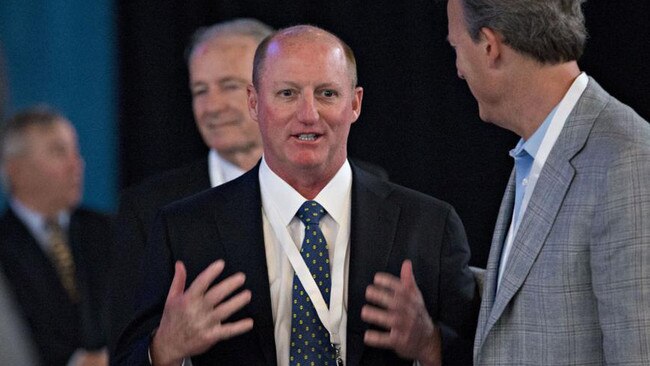
Apple still represents the biggest single holding for Berkshire, with about $US135bn left on the books.
Buffett’s sale couldn’t have come at a worse time for the tech giant. It has been one of the laggards of the so-called Magnificent Seven tech stocks – Tesla being the other – on signs that demand is cooling for Apple’s core products. Figures released last week show global sales of the iPhone fell, and the company often seen as the cutting edge of tech is starting to lag Silicon Valley rivals in rolling out artificial intelligence.
Apple shares have missed the takeoff seen in rivals Nvidia, Meta and Google’s owner. They are largely flat since January and only up just 5.5 per cent over the past year.
Berkshire has been an investor in Apple since 2016 before the tech play started its supercharged run. Buffet said he would continue to be a backer of Apple for the long term. (The tech company’s CEO, Tim Cook, was sitting in the audience).
Buffett suggested the sale was to do with looming tax payments as well as building a cash position amid a more conservative footing given the “composition of what’s going on in the world”.
“We will have Apple as our largest investment,” he said, adding that it was an “even better business” than his other stalwart investments, Coca-Cola and American Express.
“We will own, unless something really extraordinary happens, we will own Apple and American Express and Coca-Cola,” he said.
Berkshire’s extraordinary cash boost could also suggest the investment house is taking a more cautious outlook given there are limited options to deploy it.
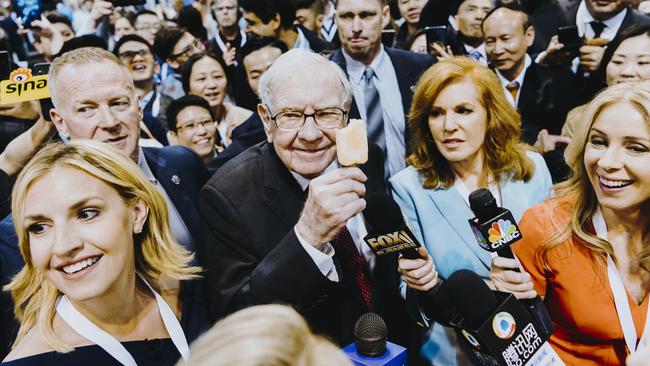
Berkshire’s record cash pile has growth to more than $US186bn and this was expected to move to $US200bn, Buffett said. He has been ploughing the funds into US treasuries, where it has been getting interest rates in excess of 5 per cent.
He didn’t make a comment on the outlook for US interest rates, although he said US Federal Reserve chair Jerome Powell was “a very wise man”.
“We’d love to spend it (cash), but we won’t spend it unless we think we’re going (to) something that has very little risk and make us a lot of money,” Buffet said.
The additional cash gives Berkshire the capacity to move quickly on the market if needed, he added.
“As the world gets more sophisticated, complicated and intertwined, more can go wrong,” Buffett told the meeting, and said he wanted to act when it happens.
In recent weeks he has topped up holdings in US oil producer Occidential Petroleum although, at just over $US300m, it is a fraction of overall cash holdings.
For many, the meeting gave more of a look at what Berkshire will look like after Buffett.
Inside the massive conglomerate that backs names like Apple, Coca-Cola, American Express and Chinese EV maker BYD, succession planning has been as meticulous as it has been slow moving.
As he has done for more than a half century, Buffett chaired the meeting, taking questions from shareholders for nearly three hours. His responses were measured; peppered with jokes and full of his trademark insights into investing. This philosophy comes down to a focus on the long term and picking strong companies at fair prices.
“If you look at stocks as a business, and treat the market as something that doesn’t tell you – isn’t there to instruct you, but it’s there to serve you – you’ll do a lot better over time than if you try to take charts and listen to people talk about moving averages and look at the pronouncements and all that sort of thing,” Buffett said.
This time around, the AGM had a different feel. It was the first meeting since the passing last November of Charlie Munger, who was his trusted partner for nearly six decades.
This meant more exposure was given to Buffett’s chosen successor: Berkshire’s energy boss Greg Able. Indeed, Able was sitting next to Buffett on stage in the spot where Munger once sat.
At one point during the Q&A, Buffett threw a question to Abel, but accidentally referred to him as “Charlie”. The chairman quickly corrected himself with “I’m so used to that”.
Buffett signed off the marathon meeting with a joke: “I hope I come next year.”
johnstone@theaustralian.com.au
Originally published as Why the economy is about to get some hard truths


